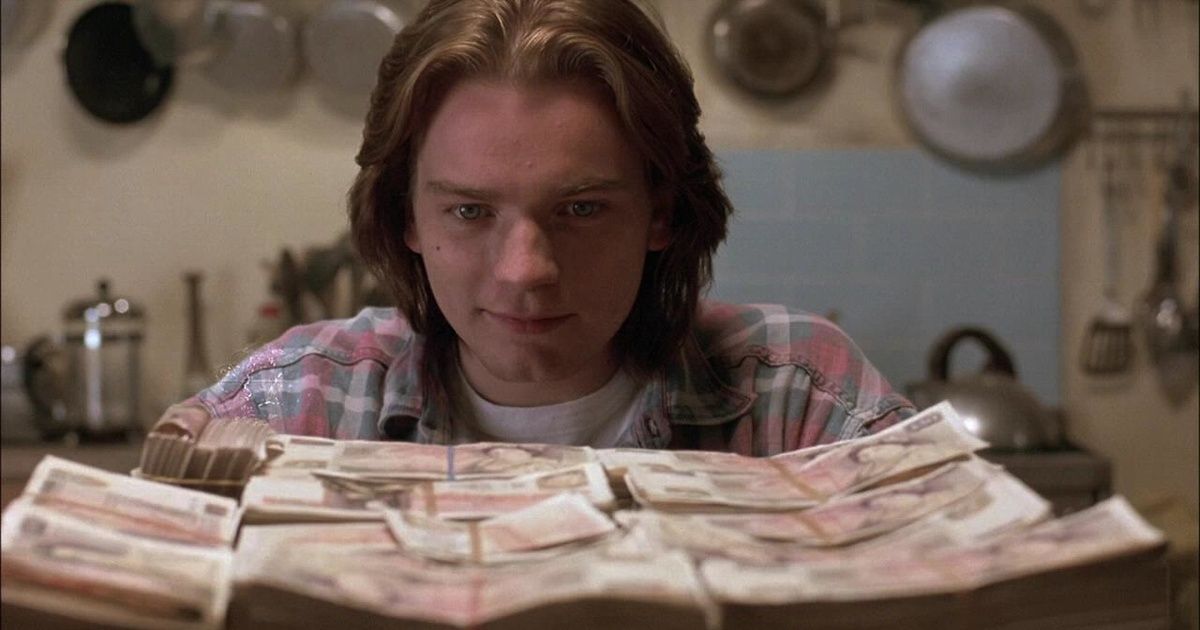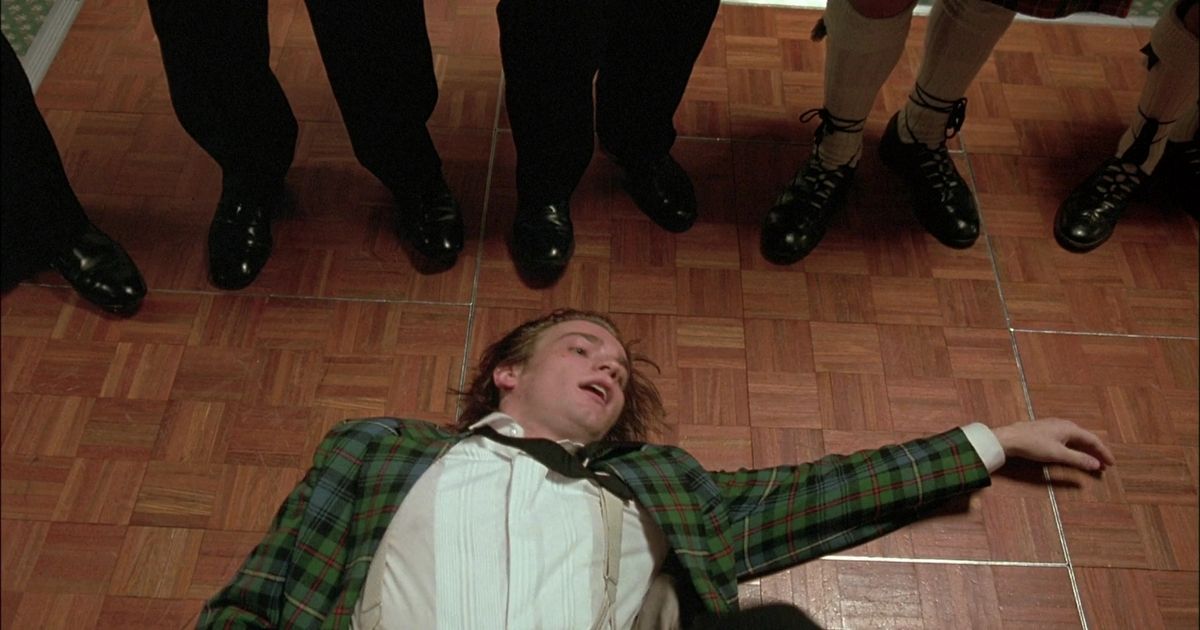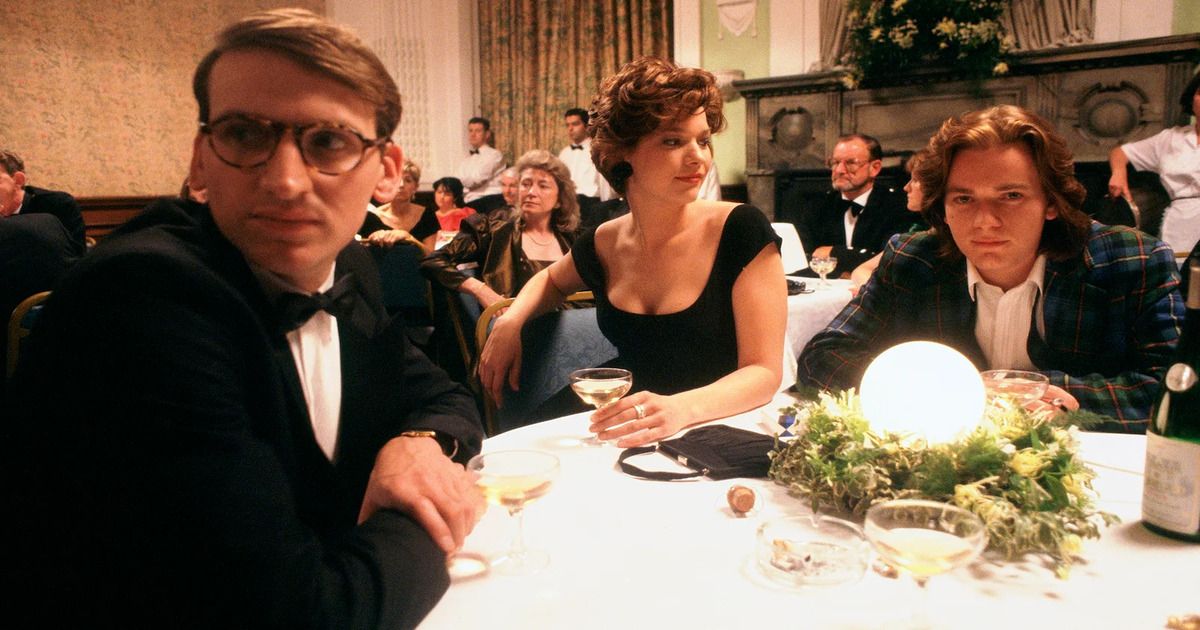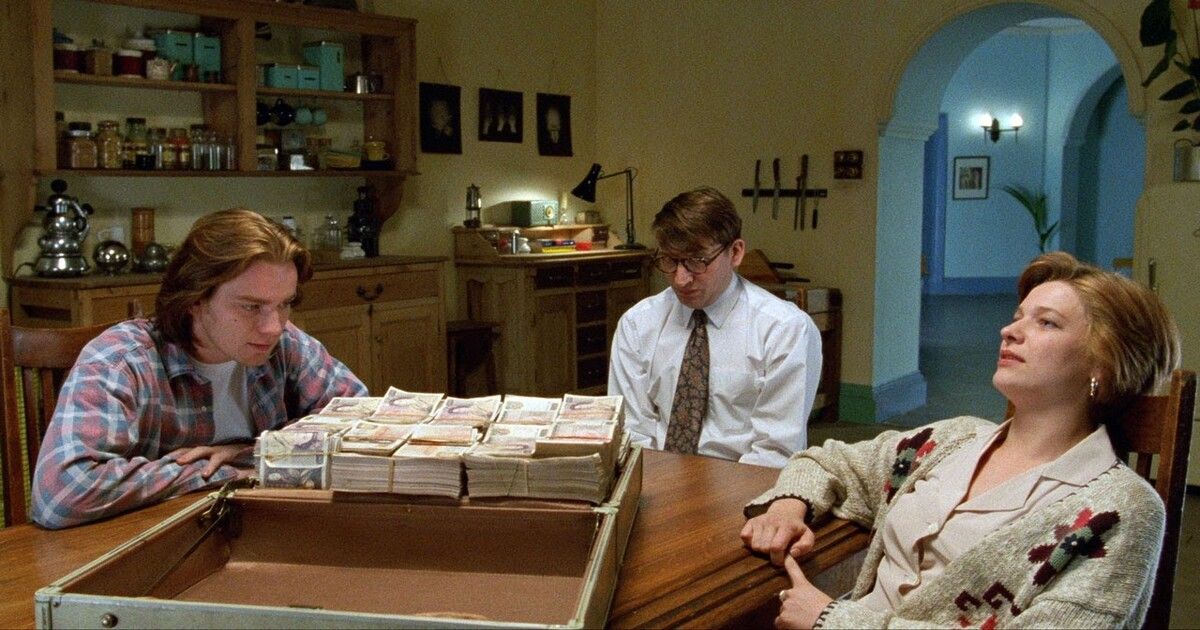The world of British film in the '90s was due for a bit of a shakeup. The first big hit of the decade was unsurprisingly, a World War II film called Memphis Beale (1990), starring Matthew Modine and Billy Zane. While it performed exceedingly well, reviewers at the time couldn’t help but point out its somewhat hollow, clichéd formula. A couple of years later, the period drama Remains of the Day (1993) topped the British box office, following a lovelorn butler through the telling of his life story. And the following year, the romantic-comedy Four Weddings and a Funeral (1994), starring Hugh Grant and Andie Macdowell, was the top-grossing British production.
All fine movies in their own right, they reflected the somewhat restrictive prevailing trends of the time: formulaic war-focused period pieces, subtle post-war aristocratic dramas, and charming modernist romantic comedies. In other words, some fresh blood was much needed in the world of British film. In 1994, Danny Boyle, a first-time film director, made waves with Shallow Grave, a fresh, darkly funny crime movie geared towards younger audiences. Having gotten his start in theatre and TV, Boyle’s debut was a bit of a gamble, but the reward was most certainly worth the risk. Grossing almost $20 million worldwide and garnering the BAFTA award for Outstanding British Film, Shallow Grave launched Boyle into the stratosphere.
Boyle’s follow-up film, Trainspotting, took that success to the next level, helping the director achieve international fame and laying the foundation for the rest of his career. But Shallow Grave holds its own almost just as well, living on as a fun dive into the hubristic foibles of narcissistic youth. The casting of Kerry Fox feels like an obvious attempt to capitalize on her art house street cred at the time, but Boyle struck gold in finding Ewan McGregor, a then-unknown talent. His performance is the highlight of the film, never uttering a false note in its 90-minute runtime. Danny Boyle’s energetic shooting style and John Hodge’s darkly comedic script come together in perfect harmony, capturing a mood and era entirely specific and undeniably relatable.
The film spoke to twenty-somethings in the UK on their level while also capitalizing on the demand for crime thrillers in the '90s. It was witty, it was dark, and most of all, it was a bloody fun time at the movies. When Boyle read the script for the first time, he thought of the Coen Brothers film Blood Simple (1984) immediately, and that connection excited him. The idea of making a film in the style of an American B-movie, while injecting it with a uniquely British sensibility, was a fresh, untapped vein. Revisiting the film today, it's special blend of campy horror elements, fun banter, and tongue-in-cheek thriller tropes make it a great late night movie to watch with friends, and an important benchmark in British cinema and genre films more broadly.
An Innocent Proposition
The premise of the film is strikingly simple: three flatmates in Edinburgh are on the hunt for a new roommate. The trio consists of an immature news reporter called Alex (Ewan McGregor); a bubbly physician named Juliet who can’t stop getting phone calls from past lovers; and a high-strung accountant called David, who hates his job and himself. They begin interviewing candidates rapid fire, but it’s clear from the jump that Alex is more interested in mocking these would-be roommates than locking one down. Finally, they meet a decent enough guy, a writer named Hugo (Keith Allen), and agree to let him room in their flat.
The morning after he arrives, however, they find that he’s locked himself inside his room and won’t answer the door. They bust the door down, finding him dead, sprawled out naked on his bed. Considering her line of work, Juliet isn’t too started, and proceeds to close his eyes and wrap him up. Alex can’t help but snoop around the room, eventually finding a briefcase full of cash underneath his bed. The central thrust of the plot kicks in soon after; the trio must decide whether to report the murder and lose the money, or hide the corpse and take the reward as their own. David, being a much more reserved and sheepish guy, resists the devious plot right away. But it’s clear he’s miserable at his job, and with enough convincing from Alex, he agrees to help them bury the body.
They decide to sink Hugo’s car in a nearby pond, cut off his hands – considering his fingerprints – and bury the body in the forest. They draw straws and David is stuck with the grisly responsibility of sawing off Hugo's hands Intercut with their morbid plot are scenes of two mysterious henchmen cavorting around town, looking for Hugo. They interrogate unknown men for information about Hugo, killing as they go. After the deed is done, Alex and Juliet go on a spending spree around town to blow off some steam. David, his conscience much heavier, becomes paranoid and locks himself up in the attic with the money. The two henchmen eventually find the trio's flat and break in. David lures them into the attic and kills them, and without being asked, takes them out into the woods and performs the same hatchet job. The ending of the film becomes a violent struggle as tensions rise among the trio of friends. Juliet tries to seduce David to calm him down, but he sees through her scheme.
In the end, David pins Alex to the floor with a knife, and is then impaled from behind by Juliet, dying by her hand. Thinking that Alex is dead, Juliet grabs the suitcase and flees. In her car, she opens it to find that it's full of nothing but newspaper. As the police occupy the flat in the ending shot, we see that Alex isn’t dead after all, only stuck. The camera follows the stuck knife down beneath the floorboards, where Alex has stashed all the cash for himself.
Blood and Guts
While the film begins with an exciting fast-paced montage of club music and funny banter from the roommates, the revelation of Hugo’s corpse quickly changes the pace and sets the tone for the rest of the story. And when they’re out in the forest disposing of it, dark turns utterly grim as David hacks and saws into flesh. After this scene, David is a changed man. Sure, Alex had to dig the hole and Juliet was tasked with disposing of Hugo’s hands in the hospital waste bin, but David had to physically cut into the dead man’s flesh. David isn’t the only offender, though, as the two violent henchmen leave a trail of blood in their wake as well. In one scene, they interrogate an informant by dunking his head repeatedly in a bathtub.
Failing to provide any information regarding Hugo’s whereabouts, they drown him in the tub, the water turning a crimson red. When these two henchmen do track down Hugo’s final stop and break into the flat, David is ready. He lures them into the attic and smashes them both over the head with a hammer one-by-one. And when he takes them out to the forest to dismember and bury them, viewers are treated to the most sinister scene of the film. Awash in a blood-red floodlight, David saws into their flesh like a professional on a mission.
Fun and Games
Before a lot of the bloodshed and struggle ensues, there are a few great scenes of merriment and joy as the story explores the lives of these young idiots. The aforementioned roommate interviews at the beginning of the film are an absolute romp, cut together with fun swooping and gliding camerawork. A bit of a jokester, Alex can’t help but make fun of a dweeby guy named Cameron. “What on earth could make you think we’d like to share a flat like this with a guy like you? I mean, my first impression is that you have none of the qualities we seek from a prospective flatmate. I’m talking here about things like presence, charisma, style and charm, and I don’t think we’re asking too much.” Alex is a bit of a bully in this scene, but it’s all in good fun and David and Juliet eat it up. Even the more straight-laced David gets in a few laughs, asking an applicant if they ever “do a little freebase from time to time.” He also insists on quizzing another applicant, playing a cassette and demanding that she list off the song, the singer, and their three other hit singles.
Edited with a frenetic tempo, it’s a high-energy start to the film and establishes a youthful vibe. The next sequence consists of vignettes of Alex and David at their day jobs. It’s clear that Alex’s quick wit and fluffy mane make him popular at work with the ladies, and that David’s boring by-the-book demeanor is rewarded by his bosses. Creating a cheeky contrast of audio and visuals, these scenes are intercut with clips of Hugo’s body lying frozen stiff on his mattress, with Nina Simone’s “My Baby Just Cares For Me” playing in the background. It’s a simple sequence, but it puts Boyle’s mastery of tone on display right away.
After they’ve done their evil deed and disposed of Hugo, the three of them go out to a fundraiser for Juliet’s work to blow off some steam. Alex and Juliet dance and drink champagne, flirting and laughing like they’ve done nothing wrong. Meanwhile, David struggles to cut loose under the weight of crimes. When one of Juliet’s coworkers asks her to dance, David flies off the handle and screams at him. He also refers to Juliet as his girlfriend, underscoring some of the underlying sexual tension present in the friend group. They even spot Cameron, the dweeb from the opening segment, and Alex takes the opportunity to make fun of him again, much to Juliet’s delight. But when Alex takes a pee break, he pays for his childlike antics. Cameron and some of his pals corner him in the stall and knock his lights out.
But there’s still some more fun to come before the bloodshed. Alex and Juliet go on a massive shopping spree, buying a video recorder, a TV, an RC car, a crossbow, booze, and lots of other fun toys. A fun scene of the two of them plays out; drunk out of their minds; they roll around the floor of the flat in a heap of capitalist excess. The party’s over when David finds them like this, chewing them out for spending 500 pounds on their fancy camera.
A Smashing Success
In the end, Boyle pulls off a somewhat surprising feat. He turns the remarkably simple premise of three friends looking for a new flatmate into a murder plot with a lot to say about the hubris of youth. Once they have their large sum of money in hand, they haven't the slightest idea what to do with it. They're essentially kids, woefully unprepared for the consequences of their actions, and they're forced to pay the price. The film also succeeds in forcing the audience to root for a trio of truly mean, unsympathetic people who get by on charisma and good looks alone. Alex, arguably the least sympathetic character, walks away with the cash in the end, and it somehow feels justified regardless. And this feeling of victory is palpable – it’s hard not to root for Alex in the final moments of the film.
Despite all the odds stacked against him, despite his never-ending slew of self-motivated, careless actions, he’s able to slip through the cracks. In a sense, he’s the wise-cracking, good-looking punk that one might wish they had the confidence to be. Sure, he’s a bit of a jerk, and sure, he’s got some bad karma coming his way, but he’s having a helluva fun time in his youth, and it’s infectious to say the least. Ultimately, it’s McGregor’s performance that makes the film, and his joie de vivre is as fresh and intoxicating today as it ever was.





